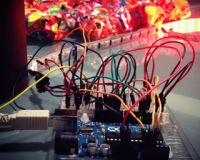Posted on Thu 26 May 2016
The trick to understanding magic? Don't ask how, ask why!
People always ask magicians ‘How did you do that’? But if you actually want to know how a trick works, that’s probably the least useful question you could ask.Believe me, the mechanics of magic really are the least interesting bit (unless you’re a slightly obsessive adolescent). Where the…

Posted by
Project

Magician in Residence: Kieron Kirkland
During his residency, Keiron researched the synergies and opportunities between magic and the maker movement.People always ask magicians ‘How did you do that’? But if you actually want to know how a trick works, that’s probably the least useful question you could ask.
Believe me, the mechanics of magic really are the least interesting bit (unless you’re a slightly obsessive adolescent). Where the trick actually happens, where the ‘magic’ actually exists, is in your mind. So the real question you should ask is, 'Why did I believe that happened?'

Image: http://www.exeter.ac.uk/bdc/exhibitions_houdini/houdini05_memorabilia.shtml
That’s a much more interesting question and you can’t answer it without exploring how we actually think magic happens. These days people use magic to describe something that is inexplicable. But that’s not always been the case. Magic used to have lots of explanations, whether goblins, ghosts or Gods. Forgetting this, and not giving audiences a good story, has led us to perform bad magic and do things with some pretty lame explanations.
Here’s a list from an 1897 book about the different ‘types’ of magic’ or ways that magic can happen
- Feats of Dexterity (being a bit whizzy with them fingers, ‘or tongue’ it suggests, oddly)
- Experiments in Natural Magic - ‘experiments’ derived from science, such as making things grow unnaturally fast for example (not, presumably, making fluorescent rabbits)
- Mental conjuring - mind reading / mind control (making people think they see fluorescent rabbits)
- Pretend mesmerism - (I love that they feel the need to distinguish this from 'real' mesmerism) this includes clairvoyance, trance and second sight
- Mediumship - spiritualism, spirit writing (obviously)
Now compare this to what often happens now. Ever seen a magician click their fingers over a pack of cards, or sprinkle ‘woofle dust’ onto something? That’s a pretty poor explanation of how magic happens, and shows us how lazy we’ve gotten in the story we’re telling audiences. What would you rather see on a Friday night, someone clicking their fingers like a poor rendition of a Shakin Stevens song, or a bit of pretend mesmerism and trees inexplicably growing all over the stage?
What’s interesting about this list though, is that it’s of it’s time and reveals something really important. The ways that the magic happens reflect the popular and fashionable explanations for the impossible at the time. In the 19th century lots of people saw mediums, believed in ghosts, and the ‘natural sciences’ were an unstoppable source of discovery and amazement. This gives insight to the fact that the greatest conjurors are able to weave rich and believable stories about how and why something is happening. But more than that, these stories inherently reflect the development of society and expose truths about the source of the unexplained, and the possibilities for humanity.
In the 20th century the best example of this is Uri Gellar. Psychic phenomena were all the rage in the 60s and 70s, leading even the american military to take an unhealthy interest in staring at goats (to kill them, if you haven’t read the story. It also goes a long way to explaining why goats alway look a bit suspicious of you if you are wearing khaki). Despite Uri facing lots of people telling him he’s a fake in the last 40 years, and a lot of persuasive exposes suggesting he achieved his demonstrations using trickery, some people still firmly believe he is the real deal. Why? Whether he is or not, I think because he presents such a compelling story about how the magic happens. He draws on a pertinent societal narrative, and, even better, makes us believe we could do it too! That’s a damn sight more compelling story than some crappy woofle dust.
My question is what are the societal narratives for the inexplicable today? Magicians have become very interested in psychology over the last 10-15 years, and many take after some pioneers in this area to tell a story that a certain card trick has been achieved through psychological means (I'm one of them). Of course the most interesting bit about this is that the real pioneers mix genuine psychology with magic. You don't know where the psychology stops and trick starts. But what other zeitgeist narratives can magic use to help make it’s performances relevant to modern audiences?
This question is what takes up half my time on this residency. I want to see if technology can be that story. There’s a great video with Seth Raphael claiming a million dollar prize for a mind reading machine. But it’s the only time I have ever seen technology used to convince people of magic in a believable way. During this residency I am hoping to build on that idea. It’s not without it’s challenges. As I’ve argued, people want to believe that amazing things are possible, that’s what magicians help us to do. But ultimately people really want to feel that they can do amazing things themselves. How can I keep this empowering role of magic, and not let the technology be the centre of the attention? How can I make sure it’s an attractive enough hook to interest people, but doesn’t alienate or dominate the performance? What are the great tech stories I should be using? I’d welcome your thoughts, especially at this early stage.
